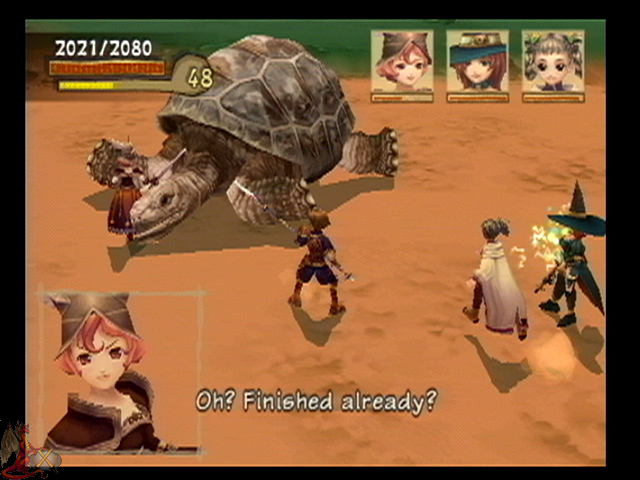|
|

|
BATTLE SYSTEM
|

|
INTERACTION
|

|
ORIGINALITY
|

|
STORY
|

|
MUSIC & SOUND
|

|
VISUALS
|

|
CHALLENGE
|
Medium
|
COMPLETION TIME
|
20-45 hours
|
|
OVERALL
3.0/5
|
Rating definitions
|
|
|
When it comes to combining two tasty ingredients together in the hope of creating a dish better than the two ingredients separately, there seems to be only two kind of results: fantastic success or horrible failure. Peanut butter and chocolate? Fantastic success. Pizza and ice cream? Horrible failure. This dualistic maxim seemed to carry over into the videogame industry in general, and RPGs in particular, rather well. After all, when Squaresoft teamed up with Disney to create the Kingdom Hearts series, games that combine Square production values and character development with Disney's vast wealth of world-building material, what resulted was a rather fantastic success. So what resulted in the combination of Square production values and Final Fantasy-esque styles combined with the tri-Ace penchant for number crunching and huge ranges of options? Well, suffice it to say, Radiata Stories is perhaps the most imminent counter-example to the dualistic maxim by being a combination that is almost completely tasteless.
The primary difficulty with Radiata Stories is that one cannot shake the feeling of mediocrity that, well, radiates from the overall game experience. For example, the battle system feels like it was put together rather nicely at first, but inevitably begins to show wear around the tenth hour of play. Differing from a direct port of the Star Ocean series battle system, Radiata Stories allows the player to control only Jack Russel while fighting, with the player able to give the AI mere orders later in the game. Each successful attack increases the Volty Gauge, which is essentially a reverse Limit Break meter that can be drawn from in order to execute powerful attacks, give units orders, and initiate formations. In practice, Jack is the only source of any significant or even reliable damage, with the party serving only a secondary role of absorbing attacks or allowing Jack to make a formation, which typically grants Jack an increased attack or defensive power. Since the AI is useless most of the time and the game immediately ends if Jack dies, the focus of every battle simply becomes inane button-smashing to a degree not typically seen beyond Action games.
This singular focus on the main character is so bewildering considering Radiata Stories goes so out of its way to encourage the player to recruit as many of the 150+ characters as possible. Almost every single NPC in the game has a unique character model and name, along with a daily schedule the player has to frequently plan around in order to recruit them. The in-game clock ticks down the hours almost without pause, while the NPCs of the world walk about the world of their own accord. Certainly, compared to normal RPGs with their handful of static townsfolk, seeing this level of detail is rather refreshing. Unfortunately, Radiata Stories introduces the brilliant new mechanic but places it in a larger framework which renders the entire exercise pointless. Once recruited, characters are essentially interchangeable with none of them particularly contributing to combat better than others. Indeed, since the player cannot change their equipment or attack routine, the only two reasons to pick one character over another is aesthetic concerns or varying the ranges of disgust over the incessant battle cries. Making matters worse, Radiata Stories includes a fork in the main plot which forces the player to decide between two course of actions, one of which results in the permanent disbanding of practically all recruited characters up to that point.
 "I just can't do it, Cap'n. I don't have the power!
"I just can't do it, Cap'n. I don't have the power!
|
|
Progressing through the plot is a relatively painless affair, if not even pleasant at times. Jack Russel is the son of a legendary Radiata Knight, and is determined to likewise make his way into history. The pitfalls and misadventures come tempered with a healthy dose of straight comedy, which helps the hours of constant battling become almost endearing. That is, until it appears that veteran writers of Square got a hold of the manuscript about halfway through the game. The plot immediately nose-dives into convoluted melodramatics, which does not at all fit with the style of gameplay or even presentation at the beginning. This eventually spires down into deeply disappointing endgame that bears little resemblance to the first twenty hours of play.
The disappointment is especially bitter since those first twenty hours seemed so fun. The towns were vibrant, beautiful, and alive. Being able to literally kick every object and character in the game was a unique spin on the classic RPG cliche of examining every stick of furniture for potions. The in-game clock and the independent NPC routines made characters seem like real people, with things to do beyond waiting for the hero to show up and add them to his roster. Changing Jack's armor actually resulted in his character model changing, which is also something not often seen in this genre. Jack had a bunch of different weapons he could equip, attack routines could be customized, and there always seemed to be neat quests to undergo. But somewhere along the way, the game direction just turns on its head. Now, all that time spent waiting for the clock to tick past 2 AM since there is no way to advance time in the game seems wasted when generic character #101 is stripped from the party during an arbitrary fork in the plot. As the interest in the story wanes, so too does the battle system begin to fall apart. It becomes less fun to be forced to play two hours at a time because the designers thought it would be cute to have only one or two save points in existence, with one of them almost always advancing the plot when used. As Jack becomes an unstoppable force capable of killing everything in sight by himself, the horrible, horrible war cries in battles begin forcing the player to avoid future encounters at all cost. Even the voice acting and music, the two things remarkably good in this game, take a turn for the worse as the script causes good voice actors to spout ridiculous lines and constant backtracking force volume control.
 Slow and steady wins races, but makes for poor battles.
Slow and steady wins races, but makes for poor battles.
|
|
Ultimately, Radiata Stories remains a combination of flavors that just did not quite work out in the final product. It seems like such a shame too, as the basic premise was fairly solid and the innovations served as a refreshing change of pace from the average save-the-world adventure. If only the second half of the game could have more resembled the first, Radiata Stories could have been a serious contender for game of the year. As it stands, Radiata Stories only demonstrates that too many cooks spoil the soup. Or in this case, the peanut butter and chocolate ice cream pizza.
Review Archives
|









